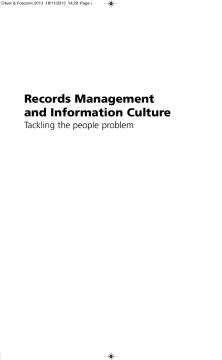
Additional Information
Book Details
Abstract
This book explores how an understanding of organisational information culture provides the insight necessary for the development and promotion of sound recordkeeping practices. It details an innovative framework for analysing and assessing information culture, and indicates how to use this knowledge to change behaviour and develop recordkeeping practices that are aligned with the specific characteristics of any workplace. This framework addresses the widely recognised problem of improving organisation-wide compliance with a records management programme by tackling the different aspects that make up the organisation’s information culture. Discussion of topics at each level of the framework includes strategies and guidelines for assessment, followed by suggestions for next steps: appropriate actions and strategies to influence behavioural change. Key topics covered include: background and context; the value accorded to records; information preferences; language considerations and regional technological infrastructure; information-related competencies; awareness of environmental requirements relating to records; corporate information technology governance; trust in recordkeeping systems; bringing it all together. Archivists, records managers and information technology specialists will find this an invaluable guide to improving their practice and solving the ‘people problem’ of non-compliance with records management programmes. LIS students taking archives and records management modules will also benefit from the application of theory into practice. Records management and information management educators will find the ideas and approaches discussed in this book useful to add an information culture perspective to their curricula.
This book explores how an understanding of organisational information culture provides the insight necessary for the development and promotion of sound recordkeeping practices.
It details an innovative framework for analysing and assessing information culture, and indicates how to use this knowledge to change behaviour and develop recordkeeping practices that are aligned with the specific characteristics of any workplace.
This framework addresses the widely recognised problem of improving organisation-wide compliance with a records management programme by tackling the different aspects that make up the organisation’s information culture.
Discussion of topics at each level of the framework includes strategies and guidelines for assessment, followed by suggestions for next steps: appropriate actions and strategies to influence behavioural change.
Key topics covered include:
- The value accorded to records
- Information preferences
- Language considerations and regional technological infrastructure
- Information-related competencies
- Awareness of environmental requirements relating to records
- Corporate information technology governance
- Trust in recordkeeping systems.
Oliver and Foscarini have used their wealth of experience in the countries in which they have lived and worked (th UK, the USA, Canada, NZ, Germany and Italy) to inform this interesting and thought-provoking work which I recommend to practitioners in the information and records management world.
Archives and Records
Gillian Oliver is an academic at the School of Information Management, Victoria University of Wellington, New Zealand. Her PhD is from Monash University, Melbourne, Australia. Her research interests centre on organisational culture, and the influences this has on the way that information is managed. She is the author of Organisational Culture for Information Managers (Chandos, 2011) and a Co-editor in Chief of Archival Science.
Fiorella Foscarini holds a PhD in archival studies from the University of British Columbia, Vancouver, Canada. Prior to joining the Faculty of Information at the University of Toronto, she worked as senior archivist for the European Central Bank. In her teaching and research, she uses archival science, diplomatics and genre theory, as well as ideas of organizational culture and information culture to investigate how records are created, managed, and preserved in organizations.
Oliver and Foscarini have produced a very useful manual for the analysis of a nebulous and often misunderstood concept of 'information culture'. The book's real value is its potential to equip the records manager with a deeper awareness of the constraints and motivators that shape people's attitudes toward information and recordkeeping and thus provide the foundation upon which properly targeted actions and strategies can be formulated.
Archives and Manuscripts
The authors' aim is twofold: 1) to identify "the messy and difficult issues which are inevitable when we attempt to manage records in organization", and 2) to address those issues. Their practical experience with archives and records management as well as their theoretical knowledge enables them to present theoretical basics and write a handbook for developing records management procedures and practices in organizations...The structure of the book and each chapter is very clear and systematic. The introductory paragraph explains the content of the chapter. Each chapter ends with a summary, a section of next steps, notes and references. Numerous clear and non-intrusive cross-references avoid overburdening the reader and the text with explanations.
Library Review
Human factors in recordkeeping - the elephant in the room. This is the book that was waiting to be written. Thanks to Oliver and Foscarini, we no longer have to wait to read it. It comes highly recommended.
Australian Library Journal
